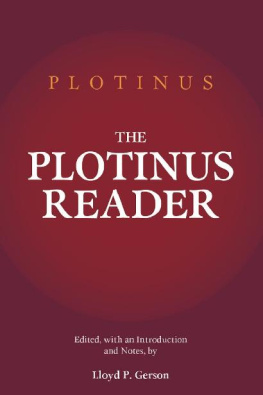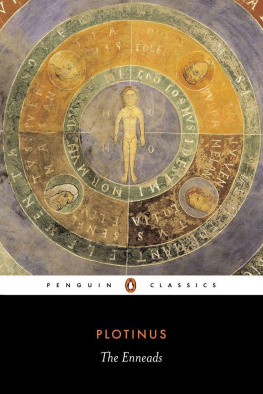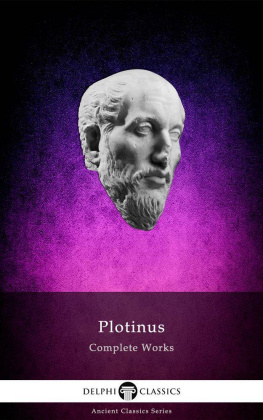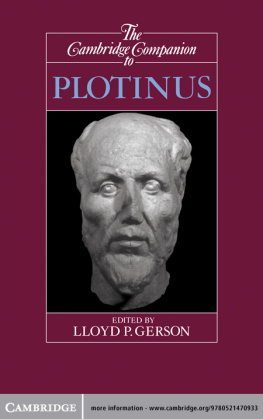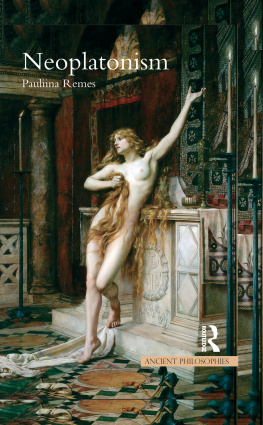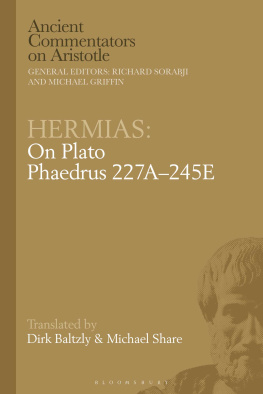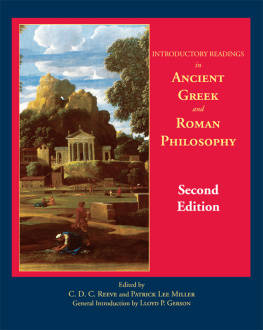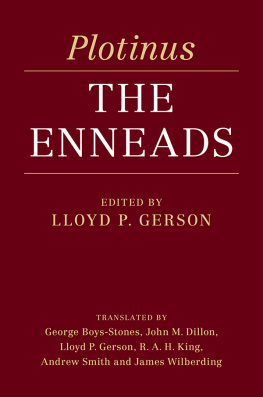Plotinus - The Plotinus Reader (Hackett Classics)
Here you can read online Plotinus - The Plotinus Reader (Hackett Classics) full text of the book (entire story) in english for free. Download pdf and epub, get meaning, cover and reviews about this ebook. year: 2020, publisher: Hackett Publishing Company, Inc., genre: Science. Description of the work, (preface) as well as reviews are available. Best literature library LitArk.com created for fans of good reading and offers a wide selection of genres:
Romance novel
Science fiction
Adventure
Detective
Science
History
Home and family
Prose
Art
Politics
Computer
Non-fiction
Religion
Business
Children
Humor
Choose a favorite category and find really read worthwhile books. Enjoy immersion in the world of imagination, feel the emotions of the characters or learn something new for yourself, make an fascinating discovery.
The Plotinus Reader (Hackett Classics): summary, description and annotation
We offer to read an annotation, description, summary or preface (depends on what the author of the book "The Plotinus Reader (Hackett Classics)" wrote himself). If you haven't found the necessary information about the book — write in the comments, we will try to find it.
Plotinus: author's other books
Who wrote The Plotinus Reader (Hackett Classics)? Find out the surname, the name of the author of the book and a list of all author's works by series.
The Plotinus Reader (Hackett Classics) — read online for free the complete book (whole text) full work
Below is the text of the book, divided by pages. System saving the place of the last page read, allows you to conveniently read the book "The Plotinus Reader (Hackett Classics)" online for free, without having to search again every time where you left off. Put a bookmark, and you can go to the page where you finished reading at any time.
Font size:
Interval:
Bookmark:
The Plotinus Reader
The Plotinus Reader
Edited
With an Introduction and Notes
By
Lloyd P. Gerson
Hackett Publishing Company, Inc.
Indianapolis/Cambridge
Copyright 2020 by Hackett Publishing Company, Inc.
All rights reserved
Printed in the United States of America
23 22 21 20 1 2 3 4 5 6 7
For further information, please address
Hackett Publishing Company, Inc.
P.O. Box 44937
Indianapolis, Indiana 46244-0937
www.hackettpublishing.com
Cover design by E. L. Wilson and Elana Rosenthal
Interior design by E. L. Wilson and Elana Rosenthal
Composition by Aptara, Inc.
Library of Congress Control Number: 2020930918
ISBN-13: 978-1-62466-895-1 (cloth)
ISBN-13: 978-1-62466-894-4 (pbk.)
PRC ISBN: 978-1-62466-933-0
Hellenistic Philosophy: Introductory Readings , Second Edition. Edited and translated by Brad Inwood and Lloyd P. Gerson.
Neoplatonic Philosophy: Introductory Readings . Translated, with Introduction, by John Dillon and Lloyd P. Gerson.
Contents
The page numbers in curly braces {} correspond to the print edition of this title.
Translations
{vii}
The genesis of this book is somewhat unusual and contains a story of remarkable cooperation between academic publishers. Around 2001, Hackett Publishing asked John M. Dillon and me to translate and edit a collection of readings from the works of the major Neoplatonists. The result, published in 2004, is Neoplatonic Philosophy: Introductory Readings. That work contained roughly 170 pages of material from Plotinuss Enneads and amounts to a bit less than 20 percent of the entire corpus. Sometime around 2010, Cambridge University Press asked me to assemble a team of translators who would produce a complete translation of the Enneads. That team included besides myself, George Boys-Stones, John M. Dillon, R. A. H. King, Andrew Smith, and James Wilberding. That work, Plotinus: The Enneads , appeared in 2018. When we began the project, I asked Hackett if we could use the material from Neoplatonic Philosophy as a basis for the translations in the Cambridge volume. Hackett graciously gave permission to use these translations and, though they were altered somewhat, they greatly facilitated the work of the translation team. Last year, Hackett approached me again, this time to produce a stand-alone volume of the Plotinus translations from Neoplatonic Philosophy , including naturally all the corrections and changes that were made for the other work. This time, Cambridge returned the favor by allowing me to use the new-old material for The Plotinus Reader , which the reader now has in his or her hands. The Plotinus Reader contains the revised translations that originally appeared in Neoplatonic Philosophy along with the new Cambridge introductions to each treatise and summaries of each section.
The default text used in this translation is that of the editio minor of Paul Henry and Hans-Rudolph Schwyzer, conventionally designated as HS. k. All deviations from that text are noted, citing, for example, the reading of HS over that of HS. Those who can benefit from the side-by-side Greek text of A.H. Armstrongs Loeb edition can do the same with the editio minor (OCT) and our translation.
{viii} In addition to the translations, the original work contains a glossary of terms from Plotinus and from his successors. This, too, was used as the basis for a similar glossary in the Cambridge volume. That glossary now appears in the present work, much enlarged, along with extensive references to the Enneads which are illustrative of the definitions given in the Glossary. The reader is invited to make frequent use of this glossary to help with Plotinuss difficult and somewhat technical vocabulary. It should be noted that the references to passages illustrative of Plotinuss terminological usage list works that are not included in this volume. Readers who want to study Plotinus further or read works of his not found here are invited to go to the Cambridge translations where all of Plotinuss writings are to be found.
Those who have had even a brief acquaintance with the Enneads know that one of the problems facing the reader or student is that seldom does Plotinus say everything he has to say about a subject in one place. Indeed, for some large subjects, like the nature of the first principle of all, the nature of intellect, soul, and so on, virtually every treatise has something to add to the overall picture. To help the reader, extensive cross-references have been provided in the notes, again including references to works not included here. These were in the original work, but were added to in the successor, although they are not intended to be complete. I caution the reader that a cross-reference does not necessarily mean that Plotinus is saying exactly the same thing in both passages; sometimes one might well wonder if he is even saying consistent things. But at any rate, it is hoped that reading these passages together will enrich the study of this most challenging but fertile philosophical mind. In addition, there are numerous references in the notes to the so-called fontes or sources for Plotinuss writings, first and foremost Plato, but also Aristotle and other Peripatetics, Stoics, and occasionally Skeptics and Epicureans, and even Gnostics. The Appendix includes an array of passages from Plato and cross-references to the text. These should be read alongside the Plotinian texts since they were no doubt very much in his mind as he wrote down his philosophical thoughts.
Translating Plotinus presents many challenges, particularly when space precludes any sort of commentary or explanatory notes. Apart from the obvious challenge presented by the complexity of Plotinuss thought, there is the problem of his rather idiosyncratic Greek and, as his biographer Porphyry tells us, the fact that, owing to his poor eyesight, he never went over anything he had written. In addition, Plotinus is generally conservative in his philosophical vocabulary, introducing relatively few new words. But since he is responding to a complex and contentious tradition (or traditions), his conservatism means that one word is meant to stand for what in other philosophers works may well mean several different things. Choosing one English word to translate one Greek word that means different {ix} things in different authors is quite difficult and sometimes almost impossible. In order to meet these challenges, or at least to ease the path somewhat for readers, a number of techniques have been adopted. Paragraphs have been introduced which are not, of course, in the Greek. Sentences have been shortened to manageable length. The core of Plotinuss philosophy is his hierarchical metaphysics with the intelligible world at the top and the sensible world below. Plotinus often uses the identical Greek word to refer to one element or feature of both. This can sometimes get very confusing. In order to address this, the convention has been adopted of using capital letters for the terms for the principles in the intelligible world and lowercase letters for their images. For example, Substance translates the Greek word ousia when referring to the intelligible being and substance translates the word when referring to sensible being. When the use of the term is unsure or ambiguous or inclusive, lower case is used as the default. The Glossary contains further information for this term and for many others. In the Glossary will be found some indications of the semantic range of the Greek terms in order to try to minimize misunderstandings based on the translations. The Glossary should serve as a de facto index of key terms.
Another feature of the translation is intended to reflect Plotinuss characteristic use of the ordinary Greek letter eta (). This is the word for or as in x y. But Plotinus uses it consistently after a dialectical clause in which he expresses one possible view or interpretation with which he does not agree. A rather clumsy but accurate translation in these cases would be, or is it not the case that... ? Apart from the awkwardness of translating one letter by seven words, it is misleading to suggest that Plotinus here means to express a rhetorical question. What he means to do is express his view (the Platonic view) on the matter. So, we translate... as in fact. To emphasize that what follows is Plotinuss considered view on the matter he has been discussingsometimes for many lineswe begin a new paragraph. This is meant to be a signpost for the reader to focus on what follows as an important step in figuring out exactly what Plotinuss position is. Other lexical devices, including the use of square brackets to indicate what is only implicit in the Greek, will be evident to the reader.
Next pageFont size:
Interval:
Bookmark:
Similar books «The Plotinus Reader (Hackett Classics)»
Look at similar books to The Plotinus Reader (Hackett Classics). We have selected literature similar in name and meaning in the hope of providing readers with more options to find new, interesting, not yet read works.
Discussion, reviews of the book The Plotinus Reader (Hackett Classics) and just readers' own opinions. Leave your comments, write what you think about the work, its meaning or the main characters. Specify what exactly you liked and what you didn't like, and why you think so.

